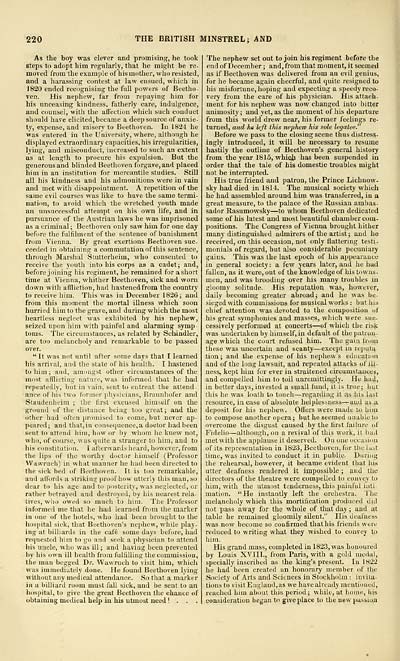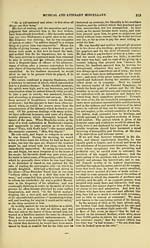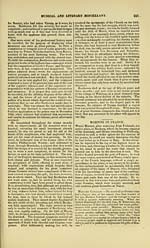Glen Collection of printed music > Printed music > British minstrel, and musical and literary miscellany
(228) Page 220
Download files
Complete book:
Individual page:
Thumbnail gallery: Grid view | List view

220
THE BRITISH MINSTREL; AND
As the boy was clever and promisinsr, he took
steps to adopt him regularly, that he might be re-
moved from the example of his mother, who resisted,
and a harassing contest at law ensued, which in
1820 ended recognising the full powers of Beetho-
ven. His nephew, far from repaying him for
his unceasing kindness, fatherly care, indulgence,
and counsel, with the affection which such conduct
should have elicited, became a deep source of anxie-
ty, expense, and misery to Beethoven. In 1824 he
was entered in the University, where, although he
displayed extraordinary capacities, his irregularities,
lying, and misconduct, increased to such an extent
as at length to procure his expulsion. But the
generous and blinded Beethoven forgave, and placed
him in an institution for mercantile studies. StiU
all his kindness and his admonitions were in vain
and met with disappointment. A repetition of the
same evil courses was like to have the same termi-
nation, to avoid which the wretched youth made
an unsuccessful attempt on his own life, and in
pursuance of the Austrian laws he was imprisoned
as a criminal ; Beethoven only saw him for one day
before the fulfilment of the sentence of banishment
from Vienna. By great exertions Beethoven sue.
ceeded in obtaining a commutation of this sentence,
through Marshal Stutterheim, who consented to
receive the youtli into his corps as a cadet; and,
before joining his regiment, he remained for a short
time at Vienna, whither Beethoven, sick and worn
down with affliction, had hastenedfrom the country
to receive him. This was in December 1826; and
from this moment the mortal illness which soon
hurried him to the grave, and during which the most
heartless neglect was exhibited by his nephew,
seized upon him with painful and alarming symp-
toms. The circumstances, as related by Schindler,
are too melancholy and remarkable to be passed
over.
" It was not until after some days that I learned
his arrival, and the state of his health. I hastened
to him; and, amongst other circumstances of the
most alllicting nature, was informed that he had
repeatedly, but in vain, sent to entreat the attend-
ance of his two fiirmer physicians, Eraunhofer and
Staudenheim ; the first excused himself on the
ground of the distance being too great ; and the
other had often promised to come, but never ap-
peared; and that, in consetiuencc, a doctor had been
scut to attend him, how or by whom he knew not,
who, of course, was qiute a stranger to him, and to
his constilutiim. I afterwards heard, however, from
the lips of the worthy doctor liimself (Professor
Wawruch) in what manner he had been directed to
the sick bed of Beethoven. It is too remarkable,
and affords a striking proof how utterly this man, so
dear to his age and to posterity, was neglected, or
rather betrayed and destroyed, by his nearest rela-
tives, wlio owed so much to him. The Professor
informed me that he had learned fnmi the marker
in one of the hotels, who had been brought to the
hospital sick, that Beethoven's nephew, while play-
ing at billiards in the caf^ some days before, had
requested him to go and seek a physician to attend
his uncle, who was ill; and having been prevented
by his own ill health from fulfilling the commission,
the man begged Dr. Wawruch to visit him, which
was immediately done. He found Beethoven lying
without any medical attendance. So that a marker
in a billiard room must fall sick, and be sent to an
hospital, to give the great Beethoven the chance of
obtaining medical help in his utmost need ! . . .
The nephew set out to join his regiment before the
end of December ; and, from that moment, it seemed
as if Beethoven was delivered from an evil genius,
for he became again cheerful, and quite resigned to
his misfortune, hoping and expecting a speedy reco.
very from the care of his physician. His attach-
ment for his nephew was now changed into bitter
animosity ; and yet, as the moment of his departure
from this world drew near, his former feelings re-
turned, and ht left this nephew his sole legatee."
Before we pass to the closing scene thus distress-
ingly introduced, it will be necessary to resume
hastily the outline of Beethoven's general history
from the year 1815, whicb has been suspended in
order that the tale of his domestic troubles might
not be interrupted.
His true friend and patron, the Prince Lichnow-
sky had died in 1814. The musical society which
he had assembled around him was transferred, in a
great measure, to the palace of the Russian ambas-
sador Rasumowsky — to whom Beethoven dedicated
some of his latest and most beautiful chamber com-
positions. The Congress of Vienna brought hither
many distinguished admirers of the artist ; and he
received, on this occasion, not only flattering testi-
monials of regard, but also considerable pecuniary
gains. This was the last epoch of his appearance
in general society : a few years later, and he had
fallen, as it were, out of the knowledge of his towns-
men, and was brooding over his many troubles in
gloomy solitude. His reputation was, however,
daily becoming greater abroad; and he was bo-
sieged with commissions for musical works : but liis
chief attention was devoted to the composition of
his great symphonies and masses, which were suc-
cessively performed at concerts — of which the risk
was undertaken by himself, in default of the patnm-
age which the court refused him. The gain irum
these was uncertain and scanty — except in reputa-
tion; and the expense of his nephew's education
and of the long lawsuit, and repeated attacks of ill-
ness, kept him for ever in straitened circumstauces,
and compelled him to toil unremittingly. He had,
in better days, invested a small fund, it is true ; but
this he was loath to touch — regarding it as his last
resource, in case of absolute helplessness — aud as a
deposit for his nephew. Ofl'ers were made to him
to compose another opera; but he seemed unable lo
overcome the disgust caused by the first failure of
Fidelio — although, on a revival of this work, it had
met with the applause it deserved. Oil one occasion
of its representation in 1823, Beethoven, for the hist
time, was invited to conduct it in public. During
the rehearsal, however, it became evident that his
utter deafness rendered it impossible ; aud the
directors of the theatre were compelled to convey to
him, with the utmost tenderness, this painful inti-
mation. "He instantly left the orchestra. Ihc
melancholy which this mortification produced did
not pass away for the whole of that day ; and at
table he remained gloomily silent." His deal'ness
was now become so confirmed that his friends were
reduced to writing what they wished to convey to
him.
His grand mass, completed in 1823, was honoured
by Louis XVIII., from Paris, with a gold medal,
specially inscribed as the king's present. In 1822
he had been created an honorary member of the
Society of Arts and Sciences in Stockholm : invita-
tions to visit England, as we havealready mentioned,
reached him about this period; while, at home, liis
consideration began to give place to the new passion
THE BRITISH MINSTREL; AND
As the boy was clever and promisinsr, he took
steps to adopt him regularly, that he might be re-
moved from the example of his mother, who resisted,
and a harassing contest at law ensued, which in
1820 ended recognising the full powers of Beetho-
ven. His nephew, far from repaying him for
his unceasing kindness, fatherly care, indulgence,
and counsel, with the affection which such conduct
should have elicited, became a deep source of anxie-
ty, expense, and misery to Beethoven. In 1824 he
was entered in the University, where, although he
displayed extraordinary capacities, his irregularities,
lying, and misconduct, increased to such an extent
as at length to procure his expulsion. But the
generous and blinded Beethoven forgave, and placed
him in an institution for mercantile studies. StiU
all his kindness and his admonitions were in vain
and met with disappointment. A repetition of the
same evil courses was like to have the same termi-
nation, to avoid which the wretched youth made
an unsuccessful attempt on his own life, and in
pursuance of the Austrian laws he was imprisoned
as a criminal ; Beethoven only saw him for one day
before the fulfilment of the sentence of banishment
from Vienna. By great exertions Beethoven sue.
ceeded in obtaining a commutation of this sentence,
through Marshal Stutterheim, who consented to
receive the youtli into his corps as a cadet; and,
before joining his regiment, he remained for a short
time at Vienna, whither Beethoven, sick and worn
down with affliction, had hastenedfrom the country
to receive him. This was in December 1826; and
from this moment the mortal illness which soon
hurried him to the grave, and during which the most
heartless neglect was exhibited by his nephew,
seized upon him with painful and alarming symp-
toms. The circumstances, as related by Schindler,
are too melancholy and remarkable to be passed
over.
" It was not until after some days that I learned
his arrival, and the state of his health. I hastened
to him; and, amongst other circumstances of the
most alllicting nature, was informed that he had
repeatedly, but in vain, sent to entreat the attend-
ance of his two fiirmer physicians, Eraunhofer and
Staudenheim ; the first excused himself on the
ground of the distance being too great ; and the
other had often promised to come, but never ap-
peared; and that, in consetiuencc, a doctor had been
scut to attend him, how or by whom he knew not,
who, of course, was qiute a stranger to him, and to
his constilutiim. I afterwards heard, however, from
the lips of the worthy doctor liimself (Professor
Wawruch) in what manner he had been directed to
the sick bed of Beethoven. It is too remarkable,
and affords a striking proof how utterly this man, so
dear to his age and to posterity, was neglected, or
rather betrayed and destroyed, by his nearest rela-
tives, wlio owed so much to him. The Professor
informed me that he had learned fnmi the marker
in one of the hotels, who had been brought to the
hospital sick, that Beethoven's nephew, while play-
ing at billiards in the caf^ some days before, had
requested him to go and seek a physician to attend
his uncle, who was ill; and having been prevented
by his own ill health from fulfilling the commission,
the man begged Dr. Wawruch to visit him, which
was immediately done. He found Beethoven lying
without any medical attendance. So that a marker
in a billiard room must fall sick, and be sent to an
hospital, to give the great Beethoven the chance of
obtaining medical help in his utmost need ! . . .
The nephew set out to join his regiment before the
end of December ; and, from that moment, it seemed
as if Beethoven was delivered from an evil genius,
for he became again cheerful, and quite resigned to
his misfortune, hoping and expecting a speedy reco.
very from the care of his physician. His attach-
ment for his nephew was now changed into bitter
animosity ; and yet, as the moment of his departure
from this world drew near, his former feelings re-
turned, and ht left this nephew his sole legatee."
Before we pass to the closing scene thus distress-
ingly introduced, it will be necessary to resume
hastily the outline of Beethoven's general history
from the year 1815, whicb has been suspended in
order that the tale of his domestic troubles might
not be interrupted.
His true friend and patron, the Prince Lichnow-
sky had died in 1814. The musical society which
he had assembled around him was transferred, in a
great measure, to the palace of the Russian ambas-
sador Rasumowsky — to whom Beethoven dedicated
some of his latest and most beautiful chamber com-
positions. The Congress of Vienna brought hither
many distinguished admirers of the artist ; and he
received, on this occasion, not only flattering testi-
monials of regard, but also considerable pecuniary
gains. This was the last epoch of his appearance
in general society : a few years later, and he had
fallen, as it were, out of the knowledge of his towns-
men, and was brooding over his many troubles in
gloomy solitude. His reputation was, however,
daily becoming greater abroad; and he was bo-
sieged with commissions for musical works : but liis
chief attention was devoted to the composition of
his great symphonies and masses, which were suc-
cessively performed at concerts — of which the risk
was undertaken by himself, in default of the patnm-
age which the court refused him. The gain irum
these was uncertain and scanty — except in reputa-
tion; and the expense of his nephew's education
and of the long lawsuit, and repeated attacks of ill-
ness, kept him for ever in straitened circumstauces,
and compelled him to toil unremittingly. He had,
in better days, invested a small fund, it is true ; but
this he was loath to touch — regarding it as his last
resource, in case of absolute helplessness — aud as a
deposit for his nephew. Ofl'ers were made to him
to compose another opera; but he seemed unable lo
overcome the disgust caused by the first failure of
Fidelio — although, on a revival of this work, it had
met with the applause it deserved. Oil one occasion
of its representation in 1823, Beethoven, for the hist
time, was invited to conduct it in public. During
the rehearsal, however, it became evident that his
utter deafness rendered it impossible ; aud the
directors of the theatre were compelled to convey to
him, with the utmost tenderness, this painful inti-
mation. "He instantly left the orchestra. Ihc
melancholy which this mortification produced did
not pass away for the whole of that day ; and at
table he remained gloomily silent." His deal'ness
was now become so confirmed that his friends were
reduced to writing what they wished to convey to
him.
His grand mass, completed in 1823, was honoured
by Louis XVIII., from Paris, with a gold medal,
specially inscribed as the king's present. In 1822
he had been created an honorary member of the
Society of Arts and Sciences in Stockholm : invita-
tions to visit England, as we havealready mentioned,
reached him about this period; while, at home, liis
consideration began to give place to the new passion
Set display mode to: Large image | Transcription
Images and transcriptions on this page, including medium image downloads, may be used under the Creative Commons Attribution 4.0 International Licence unless otherwise stated. ![]()
| Special collections of printed music > Glen Collection of printed music > Printed music > British minstrel, and musical and literary miscellany > (228) Page 220 |
|---|
| Permanent URL | https://digital.nls.uk/91437681 |
|---|
| Description | Scottish songs and music of the 18th and early 19th centuries, including music for the Highland bagpipe. These are selected items from the collection of John Glen (1833 to 1904). Also includes a few manuscripts, some treatises, and other books on the subject. |
|---|
| Description | The Glen Collection and the Inglis Collection represent mainly 18th and 19th century Scottish music, including Scottish songs. The collections of Berlioz and Verdi collected by bibliographer Cecil Hopkinson contain contemporary and later editions of the works of the two composers Berlioz and Verdi. |
|---|

